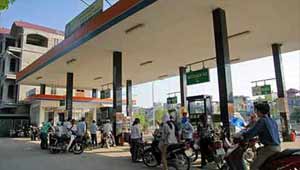 |
| Each of the different product categories will fall under a different tax regulation. For example, an environment tax of between VND1,000-4,000 will be imposed for each litre of petrol, and between VND500-2,000 for each litre of diesel. |
Public opinion about the draft environmental tax bill has focused on the specific products that should be taxed, who should pay, and what is the appropriate rate.
The draft law, which is slated for submission to the National Assembly this year, levies an environment tax on petrol and oil, coal, substances containing hydro-chlorofluorocarbons (HCFC's), plastic bags and plant protection substances. Some claim that the new regulations will result in unfair taxes on individuals and enterprises who produce, use or import products under the five categories.
Each of the different product categories will fall under a different tax regulation. For example, an environment tax of between VND1,000-4,000 will be imposed for each litre of petrol, and between VND500-2,000 for each litre of diesel.
"The high tax rate on petrol is meant to encourage consumers to switch to green energy which will help protect the environment," said head of the Ministry of Finance's Tax Policy Department Vu Van Truong.
"A high tax on petrol is also meant to ensure that the product's domestic price stays equal with the regional market. This should help limit illegal exports when Viet Nam is required to reduce the import tax on petrol in 2015 in line with its World Trade Organisation commitment," said Truong.
Some people disagree with the fact that the petrol tax is higher than the diesel tax, even though diesel oil is more harmful to the environment.
The level of harm is based on the sulphur content, according to Dr Nguyen Dinh Tuan of the HCM City Environment Protection Department.
"Sulphur content in petrol is almost zero, but the draft has levied it with a higher tax than diesel," said Tuan.
A possible increase in transport costs and freight rates following the higher tax on petrol and oil is also under discussion.
Transport enterprises have indicated their support for the environment law but oppose the high tax rates on petrol and oil, which they said would result in a remarkable cost increase for transportation services compared to other countries in the region. As a result, increased prices for many products would cause them to become less competitive in the regional market.
Questions have been posed by some parties about straight taxes on petrol and oil products without considering other factors for tax remissions and refunds.
Le Net, a lawyer with LCT Lawyers Company, pointed out that efforts have not been made to reduce taxes for big enterprises which may use more fuel but have less overall impact on the environment than smaller companies.
Net proposed that a regulation should be included in the draft that would permit tax remissions or refunds for enterprises and companies that made efforts to mitigate their environmental impact, such as installing exhaust filters.
The draft, which is expected to come into force in 2012, only deals with sources that pollute the air, said Net, adding that to make the law more effective, there should also be tax regulations for each cubic metre of waste water and solid waste produced.
Enterprises and companies that properly treat their waste water and solid waste should benefit from tax remittances and reductions, he said.
Loose management and poor environmental protection policies have led to an alarming level of pollution throughout the country. In one example, the Singapore-based Vedan company discharge around 50,000cu.m of waste water into Thi Vai River in southern Dong Nai Province each day over the course of 15 years. "To avoid cases like the Thi Vai River, regulations should be made for the collection of back taxes and heavy fines for enterprises and firms which are discovered to be polluting the environment," said the lawyer.
Experts said there should be an evaluation of the different categories of environmental impacts before regulations are developed about who the tax payers are and what are the appropriate rates.
According to the current draft, tobacco will have the highest environment tax of VND50-500 per gram, or VND50,000-500,000 ($2.8-28) per kilo.
Coal will be taxed at VND6-30 per kilo, which is the lowest tax proposed in the draft.
Each year Viet Nam spends some VND4 trillion from the Sate budget for environmental protection, but the collected environmental protection fees annually comes out to less than one third of that number.
Source: VietNamNet/Viet Nam News